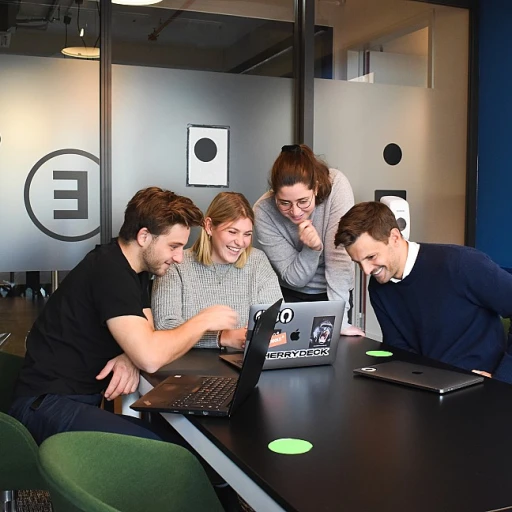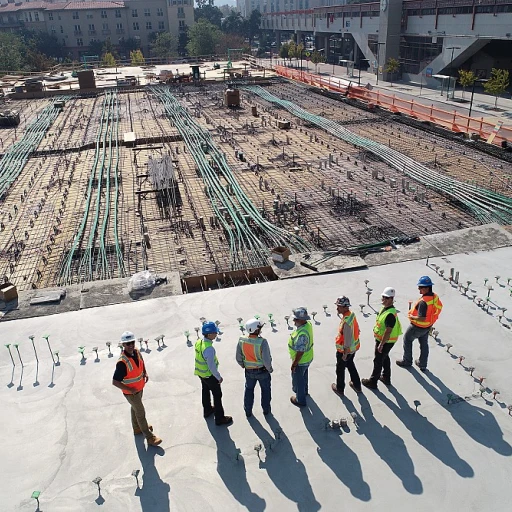
Understanding the Importance of Casual Questions
Unlocking the Potential of Casual Queries
Understanding the importance of incorporating casual questions into the interview process for tech candidates can significantly enhance the quality of hires. Casual dialogue during a job interview goes beyond assessing technical capabilities—it allows hiring managers to gain insight into a candidate's personality, work style, and cultural fit. When candidates feel at ease, they share examples of their previous experiences more naturally, allowing the hiring team to learn about their problem-solving skills and long-term potential. Interviews are not only a platform for candidates to present their qualifications but also an opportunity for companies to observe how a candidate will fit within a team. Crafting questions that blend informal and formal approaches enables a more holistic view of the candidate's capabilities. This strategy encourages open communication and helps identify people who are not just technically skilled but are also a cooperative team member. Leveraging casual questions effectively can reveal critical insights into a candidate's approach to work problems and their management style. This information is invaluable when deciding if a candidate will be a good fit for the role and the company culture. Furthermore, as work environments evolve with the rise of remote interviews, adapting these questions to different settings is crucial. To further enhance the interviewing process, using tools that allow for unique insights into candidate responses can be helpful. Explore how innovative platforms can transform traditional interviewing approaches by enhancing recruitment with video interviewing platforms, providing more engaging and effective assessments.Crafting Questions for Technical Insight
Delving into Technical Proficiency
When constructing interview questions, it is crucial to elicit responses that reveal a candidate's technical acumen, especially for roles within the tech industry. The art of crafting precise questions can often aid in unveiling the depth of a candidate's skills and their problem-solving approach, both of which are critical for determining their suitability for the role.
When interviewing, consider asking candidates to share examples of past work experiences that align with the job description. This not only allows insight into their hands-on experience but also reveals how they have previously tackled specific challenges. For instance, ask, "Can you describe a time when you encountered a major problem on a project, and how you resolved it?" This question helps evaluate their problem-solving capabilities and reveals their thought process.
Moreover, job interviews should serve as a platform to assess how candidates approach collaboration. Understanding their preferred management style and their ability to work within a team setting can determine if they are a good cultural fit for the company. Questions like "How do you manage diverse team members to ensure project success?" can provide insights into their teamwork and leadership skills.
Another aspect to consider is how a candidate's skills align with long-term project goals. Questions aimed at evaluating their vision for personal growth and contribution to the company can be telling. An example question might be, "What role do you see yourself playing in our company's long-term strategy?" Such questions not only gauge their ambition but also their understanding of the company's values and goals.
For a more comprehensive approach to enhancing tech hiring, consider leveraging collaborative interview tools during your hiring process. These tools can facilitate a more dynamic and interactive interview experience, ultimately leading to better hiring decisions.
Balancing Formality and Informality
Walking the Line Between Formal and Informal
When conducting a tech job interview, it’s crucial to strike a balance between formality and informality. On one hand, a formal approach conveys professionalism and respect for the interview process. On the other, an informal style can help candidates feel more at ease, allowing them to open up and present their true skills and personality. The key is to tailor questions to fit the context and culture of your company. Crafting questions that are slightly casual, yet purposeful, can offer a well-rounded view of the candidate’s potential. Here’s how you might approach this:- Set the Tone Early: Start the interview with a few icebreaker questions. This not only sets a welcoming tone but also helps in assessing the candidate's cultural fit. Asking about their favorite project or a hobby can reveal how they manage work-life balance.
- Blend Direct and Open-ended Questions: While direct questions about technical skills are important, open-ended questions give candidates room to demonstrate problem solving and creative thinking. For example, “Can you share an example of how you’ve approached a difficult problem at work?” encourages deeper responses.
- Encourage Storytelling: Inviting candidates to share stories about their career journey and technical challenges they’ve faced can provide insights into their communication style and adaptability.
- Align with Job and Team Requirements: Consider the team dynamics and the role's requirements when crafting questions. A mix of formal and informal questions will help in assessing if the candidate aligns with the job description and if their management style will mesh with that of their direct reports.
Examples of Effective Casual Questions
Casual Yet Insightful: How to Uncover a Candidate's Mindset
Engaging in casual questions during a tech interview can shed light on a candidate's personality and problem-solving approach beyond their technical skills. These questions can often reveal how well a person might fit within your company's team and culture.
Here are some examples of effective casual questions:
- "What project have you worked on that you're particularly proud of, and why?"
This question allows candidates to highlight their work experience and specific role in a project, offering insights into their skills and passion. - "How do you stay current with the latest tech trends?"
This can reveal a candidate’s initiative and willingness to learn, which are vital for long-term growth within a tech environment. - "Describe a time you faced a significant problem at work and how you resolved it."
This question encourages candidates to share examples of their problem-solving abilities and their approach to overcoming challenges.
Each of these questions not only assists in gauging the candidate’s technical competence but also helps in understanding their management style and how they might interact as a team member. As indicated in previous discussions, balancing formality with informality in your questions will help the candidate feel at ease, encouraging honest and open responses. Additionally, tailoring your inquiries to fit remote interview settings may require some adjustments to ensure clarity and engagement across digital platforms.
Ultimately, these casual questions serve as a complementary mechanism to traditional interview questions, enriching the hiring manager's understanding of whether the candidate will be a cultural fit and can thrive in the specific work environment your company offers.
Adapting Questions for Remote Interviews
Customizing Your Approach for Virtual Interactions
In today's job market, more companies are adopting remote interviews, which necessitates a fresh approach to crafting and delivering interview questions. When interviewing remotely, maintaining the right balance between formal and informal inquiries becomes essential, given the absence of physical presence and non-verbal cues.- Technical Setup and Comfort: Start by ensuring that both you and the candidate are comfortable with the digital platform being used. Technical difficulties can detract from the interview's focus and add unnecessary stress. Platform familiarity also allows candidates to present their best selves.
- Creating a Relaxed Environment: Engage candidates with casual questions that help ease tension. Factors like discussing previous work experience or intriguing projects are good ice-breakers. These assist candidates in feeling more like a part of the company's culture, which encourages honest and open responses.
- Assessing Cultural Fit Virtually: Without the benefit of in-person cues, it's important to ask questions that invite candidates to share examples of how they've previously worked with remote teams. Questions about management style and how an individual approaches problem-solving can give insights into their potential as a team member.
- Effective Video Interview Interactions: Use questions that are adaptable to remote settings. The goal is to elicit responses that show a candidate's long-term fit for the role. Asking how they handle problem-solving under these circumstances may reveal how they would function within your team dynamic.
Evaluating Responses to Casual Questions
Analyzing How Candidates Respond
When it comes to evaluating how candidates respond to casual questions in a tech interview, hiring managers should consider the following approaches:- Look for Authenticity: Casual questions often reveal the candidate's genuine personality. Authentic answers not only showcase the individual's true self but also offer insights into their potential fit with the company's culture. Observing how candidates express themselves and share examples of past experiences can provide a window into their problem-solving approach and adaptability to different situations.
- Assess Communication Skills: The way a candidate answers helps you gauge their communication proficiency. A good communicator will articulate clear thoughts, maintain eye contact, and actively listen before responding. These skills are essential for roles requiring collaboration with team members and direct reports.
- Evaluate Thoughtfulness and Insight: Pay attention to the depth of their answers. A thoughtful response often indicates strong analytical skills and a capability for long-term strategic thinking. This can be particularly important for roles that demand complex problem-solving and a deep understanding of intricate tech issues.
- Observe Emotional Intelligence: Casual questions sometimes uncover levels of emotional intelligence, such as empathy, self-regulation, and motivation. These traits are crucial for positions that involve teamwork, as they affect the candidate's ability to handle workplace dynamics and challenges gracefully.









